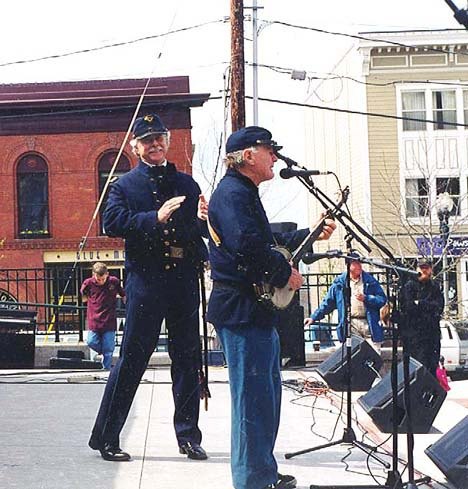National Park historian Mike Vouri and folk musician Michael Cohen will take a closer look at the Irish in the antebellum U.S. Army in words and song in a program scheduled at 7 p.m., July 10, at the San Juan Island Library.
The program is free. Call the library at 378-2798.
In July 1860, Capt. George E. Pickett’s Company D, 9th Infantry on San Juan Island was composed of three officers and 73 enlisted men. Sixty-five of the enlisted troops were foreign born and of these, 43 were Irish. Moreover, in a comprehensive survey of the 5,000 men accepted into the army in 1850 and 1851, 2,113 were Irish out of 3,516 total foreigners.
“And those numbers correspond to immigration patterns of the antebellum period,” Vouri said. “The roles jumped from 151,000 in the 1820s to more than 2.3 million in the 1850s.”
A number of factors contributed to mass immigration, the principle of these being the great potato famine of the late 1840s, which brutally swept through Ireland taking more than a million lives and leaving the survivors destitute.
Those coming to America found most jobs taken by those who had arrived in two previous waves. Those were spurred by mass evictions of tenant farmers from great estates owned by the English aristocracy. In addition to historical anecdotes, the program will capture the atmosphere of the period through traditional American folk songs as only Cohen can deliver them. These will include not only traditional Irish ballads, but more contemporary songs which have drawn on the period for inspiration.
Cohen touched on the Irish in the Army with Vouri in the play “The Life and Times of General George Pickett,” which toured the state as part of the Washington State Humanities Commission’s “Inquiring Mind” series from 1999 to 2009 when the play was retired.
In addition to being an Ecopsychology professor, author and researcher, Cohen has been cited by the Smithsonian Institution as one of the catalysts for the 1950s folk revival in New York City where he recorded and played professionally with the Shanty Boys Folk Trio and Oscar Brand.
He currently performs solo for the National Park Service on San Juan Island and with the folk group Sugar on the Floor that he formed to support local service organization functions. His musical family includes his brother, John Cohen of the New Lost City Ramblers.



